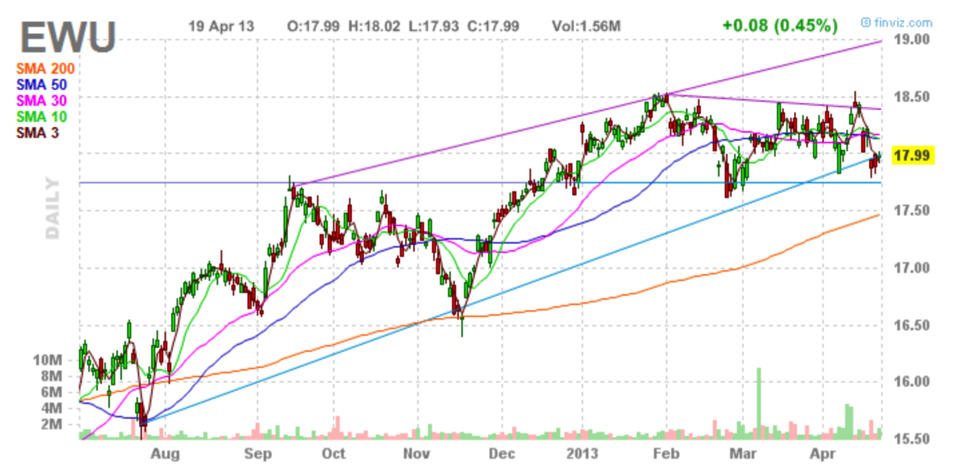 By Alex Salomon Are you familiar with Brixit? Not yet? It might become the next catchy buzzword for yet another European Union drama. Brexit, “British Exit.” After the established Grexit and $Pain and PIIGS and my own “Francestein”, Brexit could be the nth shoe to drop on the European dream… or nightmare, depending on how one looks at it.
By Alex Salomon Are you familiar with Brixit? Not yet? It might become the next catchy buzzword for yet another European Union drama. Brexit, “British Exit.” After the established Grexit and $Pain and PIIGS and my own “Francestein”, Brexit could be the nth shoe to drop on the European dream… or nightmare, depending on how one looks at it.
As I like to do, let me write my conclusion first: I am massively bullish on London’s future (and by extension, England’s) and the English economy over the next 5-10 years. Funny enough, I am writing this article from London, and it might be skewing my views, but here they are: England is going to become the new Switzerland / Luxemburg of Europe, and the world. Let’s not forget the British Virgin Islands (less than 10 miles away from where I usually write my other articles).
England is going to become the closest thing to a fiercely independent tax accommodating country (maybe not a full blown Tax Haven – that’s more for the BVI), welcoming all the spurned individuals & entities from an ever, either imploding or federalizing, schizophrenic European Union.
Now, how do we get there and why pay attention to Brexit?
Ironically, it’s pretty interesting to see Scotland playing the tricks on the United Kingdom that the UK is playing on the EU! It’s almost like watching a game of Russian dolls!
The background, just for memory, is pretty simple: England joined the EU with a very privileged and independent status. It benefits from the 4 main European freedoms of circulation (freedom of labor, capital, goods and services), while keeping a sovereign Central Bank (the CBE), its own currency and many special rules. The historical reasons for this slew of compromises are well documented, so suffice to summarize that they reflect 30 years of alternating cuddling and black-mailing between England and the EU.
The latest spat, the actual risk for Brixit, came from England’s current Prime Minister David Cameron’s January 22, 2013 announcement that should he be re-elected around 2015 and 2017, he would ask by referendum whether England should remain in the EU.
A negative answer, by popular choice, would make Brexit official and a reality.
I realize a lot of this issue is subject to conditions: Cameron would have to be re-elected, he would have to keep his promise to organize the referendum, Brits would have to say no to Europe (based on many polls, for the time being, it looks like it would be the case, but things can change fast!).
Brixit is far from happening, but it is worth putting on the radar map!
So, for his 2015 re-election campaign, Cameron will effectively run for Brexit. That will be his platform (ironically enough, he will have to fight against “Scoxit” and Scotland efforts to secede from the United Kingdom). By campaigning around getting yet even more special powers and protections from the EU or threatening to leave, Cameron is going to continuously barter and blackmail the rest of the European countries to get a special status, including special banking and financial regulations.
Considering the recent developments concerning Greece, then Cyprus and now Luxemburg, it is doubtful that the Franco-German block will accept Cameron’s conditions.
Let’s think about this: Cameron will run on an anti-European, pro-growth, anti-austerity platform, pretty much catered to the banks and financial world. Should he win the elections, he will likely have to indeed organize the referendum.
Then, the European future could change, massively: (1) either other countries would follow the English example and leave as well, thereby creating a much smaller, but probably, finally, federalizing Union (made of Germany, France, Benelux, Italy, maybe Spain), ie. a “German-engineered” EU; (2) or (less likely scenario, but worth considering), the EU would implode and disintegrate, resulting in vast area of free trade and probably free movement of tourists, but a systemic financial shock and massive devaluations of currencies; (3) or, another 5-10 years of status quo, where a British-less EU would sputter along until solutions 1 or 2 eventually pan out.
Regardless, with Brexit, England would have free reign to use the Pound Sterling, the CBE and loose financial laws to virtually become the most attractive European place for financial engineering, whether for banks, investments or large corporations. England would legally become a mix of Switzerland, Luxemburg and Lichtenstein – probably even more so, should the EU protest against it: England would exacerbate the financial competitiveness out of spite!
All of these hypothesis being laid out, the key question concerns the realistic nature of Brexit. Will it happen, despite what current polls say? Would the Brits vote themselves out of the EU? Also, would the rest of Europe be more than happy to kick the Brits out?
“If Brits want to go, let them go!” would be a common slogan outside of England, so in reality, could it be a win-win situation? Well, here comes my contrarian explanation (as always!): I really actually believe that Cameron is playing a massive game of bluff: his promise to organize a referendum is just a way for him to plan enough to renegotiate the UK status in the EU. His end game is to keep England in the EU, to avoid Brexit at all costs, to keep all the benefits, to keep a lot of British elites happy (few of them want out… Populism might make Brexit an easy theme, but that is the double-edged sword of populism). Ideally, Cameron would like to double-dip: to become the renewed financial haven of Europe and the Occidental economies AND to stay in the EU.
This is the giant Game Theory at play right now: on one hand, the drive and need for a uniformed EU (based on stronger democracy, some sort of unified elections, as well as a unified tax and financial code); on the other hand, the survival of havens, of special pockets, of protected interests.
With all of these challenges on deck, Europe is going to maintain center stage for a while longer. Grexit might still happen, $Pain might be painful, Francestein is an ugly risk, Cyprus is broken, Scoxit and Brixit are on the table, and the Italians are also hanging around… after Berlusconi, Grillo! And if you are not familiar with Slovenia just yet, you might get the surge soon.
Europe is going through teenage-like pains and Brexit is yet another potential challenge on the horizon.
Investing-wise, for the time being, I maintain an overweight bullishness on England and London’s financial economy. Just as I like Indonesia as a play on booming expansion, I see the UK financials coming out as winners from any outcome. Full Brexit would turn London into Singapore. Negotiated EU terms would mean Cameron “won” and the UK financial world would have been granted special terms.
Trading-wise, I have been in and out of iShares MSCI United Kingdom Index (EWU) and so far, I have taken long positions at every retest of the trend:
The “trade” has worked well for a while, as EWU keeps on bouncing on the blue trend line. I have a pending order to re-enter on the long side at 18.26, my stop would be $0.25 below (if it gets filled). As well, I have a long-time holding into GBPUSD, long GBP, at a 1.55 cost basis, 1.48 risk and targeting, without time frame, 1.70 and above.
It’s too early and uncertain to actively invest based on Brexit, but the concept itself should remain front and center of your European agenda. Please feel free to share your thoughts in the comments below. Thanks for reading.
Twitter: @alex__salomon @seeitmarket
Any opinions expressed herein are solely those of the author and do not in any way represent the views or opinions of his employer or any other person or entity.









